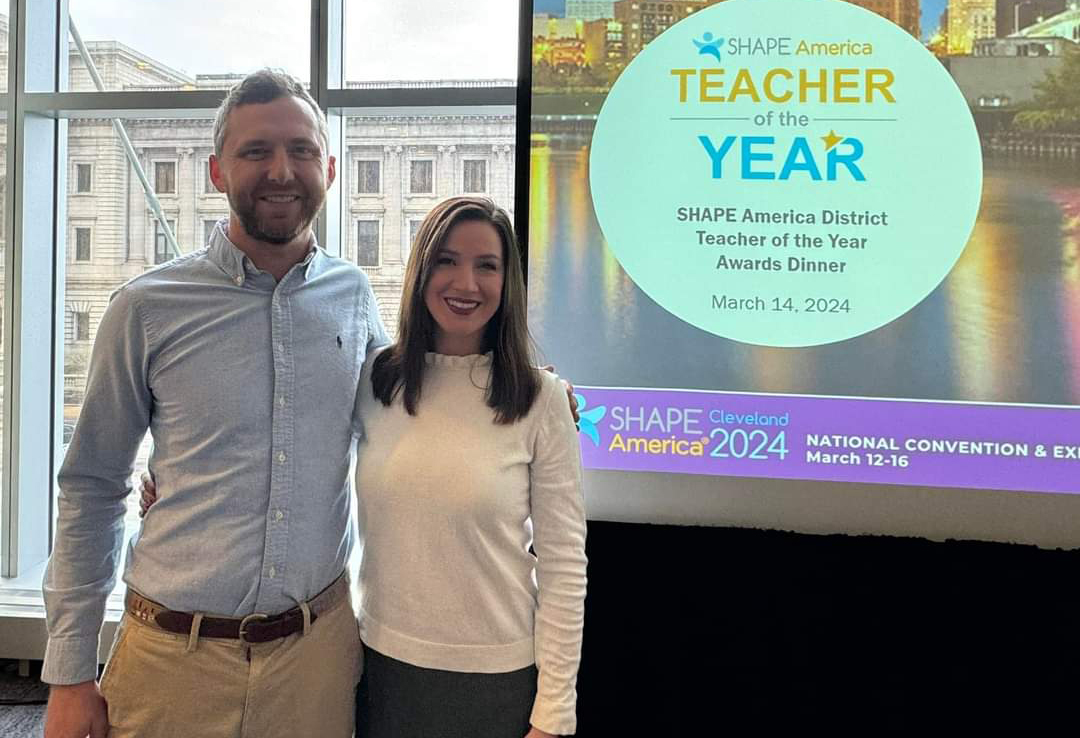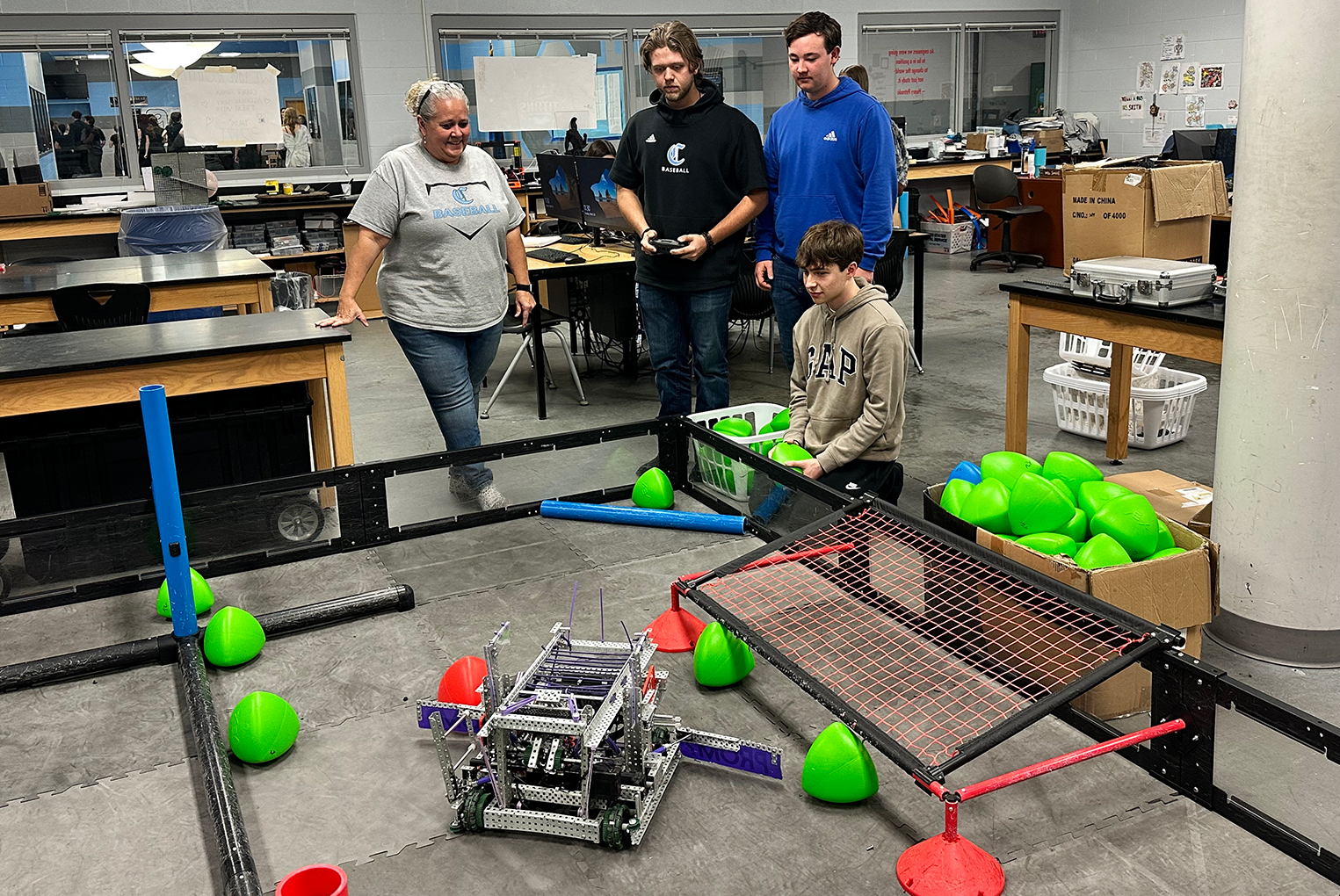
Cheryl Bailey and Tara Howard, both instructors in Magoffin County, discuss the math games presented by Joanna Stevens during the 3rd annual Let’s TALK conference.
Photo by Amy Wallot, June 15, 2015
By Mike Marsee
michael.marsee@education.ky.gov
Joanna Stevens won’t be taking her students with her on vacation, but she can take them around the world one math problem at a time.
The Lincoln County High School teacher Stevens uses a variation of the show “The Amazing Race” to make mathematics more interesting for her students. For any given lesson her students may find themselves on a virtual globetrot to distant destinations or an actual journey through the halls of Lincoln County High School.
Stevens demonstrated her approach for a roomful of teachers last week at the third annual Let’s TALK: Conversations about Effective Teaching and Learning Conference in Louisville.
“It is hard to engage students in the math classroom. Doing problem after problem is not fun, practice is not fun,” Stevens said. “These are just different ways for students to practice what they’re learning to collaborate with their peers, and for me to be able to identify misconceptions, areas where they’re struggling. And it keeps them engaged instead of just doing a worksheet.”
Stevens, the 2014 Kentucky High School Teacher of the Year, had not attended either of the first two years of the Let’s TALK conference, but she welcomed the opportunity to attend and present to some of the more than 400 teachers who attended the two-day event.
“Right now I’m focusing on being a teacher leader, so that means reaching outside of my classroom, outside my school, outside my district. I thought it would be a good experience, a learning opportunity for me,” she said.
Stevens knows that few of her students are as enthusiastic about math as she is, so she tries to raise their level of interest by demonstrating its functions in their lives. And she has tried a number of activities to make it easier for them to practice their skills.
One of them is The Amazing Geometry Race, in which teams of students “visit” a destination such as Honolulu, then solve math problems relating to an attraction or event in that location.
For example, a “visit” to a submarine museum at Pearl Harbor leads to an explanation of a periscope, followed by a word problem with multiple parts based on the angles of the periscope’s mirrors. Once they have solved the problem and their work is checked, teams move on to the next destination in the race.
Stevens has also been able to incorporate other content areas, occasionally employing a race that sends students to other parts of the school, such as the family and consumer sciences or business departments, to solve problems.
“I’ve been able to stretch across content areas with that one,” she said. “If I know they’re studying something in social studies I might have them ‘visit’ there, just to kind of combine their learning.”
And sometimes the students get to learn a little bit more about their teacher along the way.
“My husband and I travel every year, and one of the races we do every year is where I’m going, so it kind of makes it more personal for them, and it kind of gives me a chance to share a little bit about me,” Stevens said. “That’s on my bucket list, to be on “The Amazing Race,” so I share that with my students.”
Stevens also uses a Powerball game in which players pick six numbers as in the lottery game, then work out corresponding problems.
There are peripheral lessons built into Powerball as well. Stevens leads a discussion about the merit-based Kentucky Educational Excellence Scholarships (KEES) funded by the Kentucky Lottery “just to remind them that their grades and their ACT scores have consequences.”
There’s also a lesson on the long odds of winning a lottery jackpot in this game, where the likelihood of being a big winner is also remote. “They do learn not to play the lottery, because nobody gets all six numbers. They might get four of them,” Stevens said.
Jennifer Collins, a 7th-grade math and social studies teacher at Ockerman Middle School (Boone County) and a first-time attendee at the Let’s TALK conference, said she thinks Powerball would be a winner with her students.
“It’s a great exit slip, and something I can use weekly, more often than some of the other games. But all the games in there were very helpful,” Collins said.
Stevens also described a relay, often held outdoors, that combines math with movement as teams work together to solve problems and race to fill a game board.
“That one incorporates physical activity, and it’s good any time you can get students moving,” she said.
Other games she demonstrated include battleship, a variation on the popular board game that involves solving problems to sink ships on a game grid; radical bingo and Connect Four, similar games in which students solve problems to complete a game board; and tic-tac-toe, in which they focus on the steps to solving a problem rather than the answers.
The prizes are typically small – candy is a common reward – but Stevens said the students enjoy the competition.
“Anything’s better than a worksheet and doing problems out of the book, but they need practice,” she said. “There are different things the games help with: Some of the games are focused on speed, some of them focus on reasoning. But the students like knowing it’s more than just doing a math problem; they’re playing for something.”
She said the activities – some of which she developed and some of which she adapted – can have different results in different classes.
“My first year I had a geometry class, they were very close-knit and very competitive, and they loved doing ‘The Amazing Race.’ It’s kind of a higher-level game, it challenges them and they get stumped, and that class responded well to that. But that activity doesn’t work well with a lower-level collaborative class that needs more assistance,” she said.
“Just about every class loves bingo, because somebody’s going to win. The students typically don’t like Powerball because someone doesn’t always win, and that’s kind of the lesson of the lottery. And most students like the relay because I try to take them outside if it’s a pretty day. I just have to remind students that we’re still here to learn; it’s not all about winning. Sometimes they get wrapped up in the game.”
Tara Howard, a 6th-grade teacher at Salyersville Grade School (Magoffin County), said she looks forward to adapting some of the activities to her elementary classroom.
“I’m always looking for new things to make my math classroom a little more exciting for my students, to keep them engaged,” she said.
She said Stevens’ presentation was an example of what makes the Let’s TALK conference useful for her.
“I feel like this one is really helpful because the people presenting are in the classroom on a daily basis. They know what works, they see it in action, so I know that what I’m hearing is working for someone,” Howard said.
Stevens said she was learning even as she was leading the discussion.
“One of the advantages of doing the presentation is getting the feedback from the other teachers. They have time to discuss and talk about how they have time to apply it to their classroom,” she said. “The last time I presented (at a Kentucky Council of Teachers of Mathematics conference), I felt like I left the presentation benefitting just as much as everyone else.
“I tell my students to be lifelong learners, and this is just me trying to be that, trying to model that behavior for them.”
MORE INFO …
Joanna Stevens joanna.stevens@lincoln.kyschools.us
Stevens’ presentation and examples http://app.emaze.com/@AOWLITWI/student-engagement
Jennifer Collins jennifer.collins@boone.kyschools.us
Tara Howard tara.howard@magoffin.kyschools.us



Leave A Comment